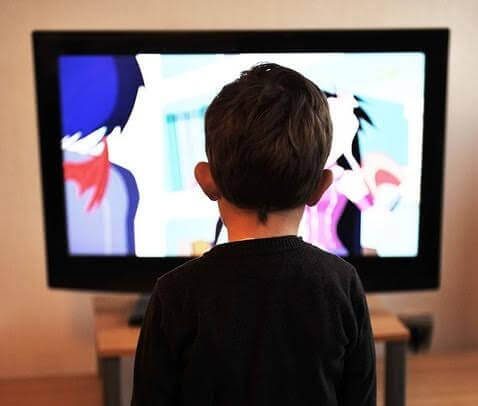Benefits of Having Space and Time for Boredom

It’s normal for children to dislike being bored. There’s almost always a certain time of day when they complain about not having anything to do. Although it seems strange, this space and time for boredom is important for their development. Why? We’ll tell you in this article.
Today’s parents worry a lot—often too much—about making sure their children don’t lack absolutely anything, not only in terms of basic needs but also opportunities and experiences.
Children are generally enrolled in all kinds of extracurricular activities: soccer, basketball, swimming, languages, piano, and art. When they get home, they have all kinds of toys and electronic devices to keep them from being bored.
Doing this actually deprives children of something that’s essential to their growth and development: having space and time for boredom. Contrary to popular belief, this is good for them. Nobody will get hurt from being bored every now and then.
Benefits of having space and time for boredom
Allows connection with oneself
When a person has “nothing to do” is when one starts asking questions like: “What do I like to do to entertain myself?” “What are my favorite activities?” “Who do I like to hang out with?”
Give your children this space for self-discovery. This will allow them to ask themselves the necessary questions to get to know their own likes and dislikes, and find their passions.
You don’t have to do or say anything to offer your children everything; just create some space for their autonomy.

Encourages creativity
Oftentimes, finding something that we enjoy involves putting our minds to work. This also applies to productive ideas.
There are many occasions in which our best ideas come to us after taking a break, in the bathtub, or even on vacation. The same thing happens to children; you just have to leave some space and time for boredom, which will stimulate their imagination in finding a way out.
Specialists state that in reality, our brains constantly produce alternatives. However, when we direct our attention to other activities, we’re unable to perceive them and thus, ignore them.
Helps us connect with others
Boredom drives children out of the house. It leads them into the yard, the street, or to the park, to explore and see what’s out there and what their friends are doing.
It’s essential for children to have the opportunity to go outside and explore. It’s also important for them to combat a sedentary lifestyle. Being bored and staying still in a chair don’t usually go hand in hand, so boredom is also advantageous in this regard.
“A generation that cannot endure boredom will be a generation of little value.”
–Bertrand Russell–
Advice for parents
- Make sure that your children have material to read, games to play, and also outdoor space where they can relax.
- Don’t plan the entire day for your children; give them the opportunity to enjoy doing nothing for a while. This will also help them learn how to manage their time.

- Regulate the time they spend on cell phones—if they’re old enough to own one—or other screens, such as television, computer, and gaming consoles.
- Don’t give them the solution to fight boredom. Let them find an alternative on their own, using their creativity.
Lastly, it should be noted that children learn from their parents constantly. If they see that we spend the day running from here to there with a phone in our hand, they’ll likely imitate our behavior.
It’s ideal to do the opposite: give yourself time to enjoy unstructured pleasure. Show your children that you’re available to get involved in the activities that they come up with, and above all, be interested in their ideas.
This affectionate interaction, as well as space and time for boredom, is very important.
It’s normal for children to dislike being bored. There’s almost always a certain time of day when they complain about not having anything to do. Although it seems strange, this space and time for boredom is important for their development. Why? We’ll tell you in this article.
Today’s parents worry a lot—often too much—about making sure their children don’t lack absolutely anything, not only in terms of basic needs but also opportunities and experiences.
Children are generally enrolled in all kinds of extracurricular activities: soccer, basketball, swimming, languages, piano, and art. When they get home, they have all kinds of toys and electronic devices to keep them from being bored.
Doing this actually deprives children of something that’s essential to their growth and development: having space and time for boredom. Contrary to popular belief, this is good for them. Nobody will get hurt from being bored every now and then.
Benefits of having space and time for boredom
Allows connection with oneself
When a person has “nothing to do” is when one starts asking questions like: “What do I like to do to entertain myself?” “What are my favorite activities?” “Who do I like to hang out with?”
Give your children this space for self-discovery. This will allow them to ask themselves the necessary questions to get to know their own likes and dislikes, and find their passions.
You don’t have to do or say anything to offer your children everything; just create some space for their autonomy.

Encourages creativity
Oftentimes, finding something that we enjoy involves putting our minds to work. This also applies to productive ideas.
There are many occasions in which our best ideas come to us after taking a break, in the bathtub, or even on vacation. The same thing happens to children; you just have to leave some space and time for boredom, which will stimulate their imagination in finding a way out.
Specialists state that in reality, our brains constantly produce alternatives. However, when we direct our attention to other activities, we’re unable to perceive them and thus, ignore them.
Helps us connect with others
Boredom drives children out of the house. It leads them into the yard, the street, or to the park, to explore and see what’s out there and what their friends are doing.
It’s essential for children to have the opportunity to go outside and explore. It’s also important for them to combat a sedentary lifestyle. Being bored and staying still in a chair don’t usually go hand in hand, so boredom is also advantageous in this regard.
“A generation that cannot endure boredom will be a generation of little value.”
–Bertrand Russell–
Advice for parents
- Make sure that your children have material to read, games to play, and also outdoor space where they can relax.
- Don’t plan the entire day for your children; give them the opportunity to enjoy doing nothing for a while. This will also help them learn how to manage their time.

- Regulate the time they spend on cell phones—if they’re old enough to own one—or other screens, such as television, computer, and gaming consoles.
- Don’t give them the solution to fight boredom. Let them find an alternative on their own, using their creativity.
Lastly, it should be noted that children learn from their parents constantly. If they see that we spend the day running from here to there with a phone in our hand, they’ll likely imitate our behavior.
It’s ideal to do the opposite: give yourself time to enjoy unstructured pleasure. Show your children that you’re available to get involved in the activities that they come up with, and above all, be interested in their ideas.
This affectionate interaction, as well as space and time for boredom, is very important.
This text is provided for informational purposes only and does not replace consultation with a professional. If in doubt, consult your specialist.








